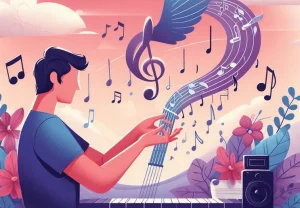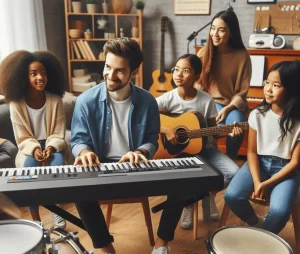The Benefits of Music Technology in Schools

1. Music technology helps to improve the understanding of musical theory
“You can use it [Logic Pro] to teach students pretty much any topic especially the use of dynamics, in a hands on practical way”. J Clarke BDA, Head of Music.
The plug-in and automation features in Logic Pro and most music software, enable students to understand classical terms such as crescendo and diminuendo on an interactive platform. Automation tools also give a level of interaction during the process, as they are able to control the dynamics according to each section and instrument. Plug – in controls such as attack, release, sustain and decay help students to visually interact with terms such as staccato, legato and accent; all essential tools when creating a highly expressive composition.
2. Develops performing, composing and arranging skills through an integrated approach
“It can enable them [students] to access compositional and arrangement techniques in a creative way from a young age”. M Barbe, MBP Head of Music.
When composing a song using an acoustic instrument, it can be challenging to write parts of the composition, plus arrange different sections – without an understanding of compositional structure and the ability to play a musical instrument. Using software solutions such as GarageBand, students are able to substitute these requirements through access to a world of instrumental loops and samples, whereby students may listen, cut and paste various samples to begin to build their own composition. The software allows students to use the interface as a canvas for their creations; to visually manipulate melody, harmony, rhythm, form and timbre.
3. Discovers hidden talents within the classroom
“I think the main benefit of using music technology in a classroom is the fact that students get exposure to unlimited resources and possibilities to use as a platform for their creativity”. L Neckles SHHS, Head of Music.
You never know how good you are until you are tested. Music technology is a medium whereby students may uncover skills they did not know they had. The use of music software such as Soundation4Education, allows a student to think critically, independent choices and cognitive judgments in the music production process. Presenting a range of musical opportunities provides the prospect of raising self-esteem, increasing motivational levels of a student and enabling them to use their creative skills for a career in the industry.
4. Music technology can further the boundaries of music and enrich music lessons for pupils and teachers, alike
“… The opportunity to learn a music is a basic human right which should be available equally to children attending schools”. John Brockhouse, Author, Getting better all the time: using music technology for learners with special needs. Australian Journal of Music Education
Children from early years through to the musically inept, gifted and disabled are able to have access to music through technology. Musical performance on a traditional instrument is often solely dependent on the users skill. Yet with technology equipment such as drum pads, synthesizers and electro acoustic instruments, illustrious samples and mind-blowing sounds can be played by the tap of a finger or click of a button. Assistive Music technology devices such as Band in a Box or Soundbeam, can be utilised in ways to engage physically challenged students to experience music performance as part of a group; but they also help to retain the students interest in music education. Without the access technology offers, higher education in music can remain closed to physically and mentally disabled pupils.
5. Music Technology enables students to extend their learning and creativity outside the classroom
“The use of music technology software aids to remove certain barriers to learning for students. It doesn’t matter if you are able to play an instrument or not, nor does it depend on your musical ability”. S Wagstaff, SBI Head of Music
Music technology is a fairly new skill, especially for primary school students. With the likes of Soundation4Education, students are able to access music production software outside of the classroom without having to afford the costly price of music production software. Today, online music software is significantly cheaper compared to the cost of purchasing musical instruments and music lessons in the long term. Through access to the Internet, students may develop music production skills by watching the vast array of tutorials from music producers from the comfort of their bedroom.
Conclusion
To conclude, music technology is the way to go. Music tech is a great way to teach composition, arranging and basic music theory to a whole class. Many schools have begun to adopt the benefits of technology as can be seen through programs such as Proclassic and level of IT capital invested in schools across London (£450m in 2013 according to Gov Today). However, there needs to be greater access for teacher CPD training in music tech, in order for schools to understand how to use the software not as an addition to the music curriculum, but to incorporate it as a tool to enable greater learning and understanding – and as a tool to facilitate greater access to music theory and performance capabilities.




